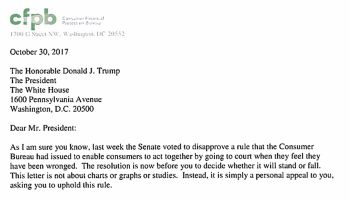Trump signs CFPB arbitration rule override
11th-hour appeal by Director Cordray predictably failed to move President
- |
- Written by Steve Cocheo
 "No dice, Director." Rejecting this plea from CFPB, President Trump undid the bureau's arbitration rule.
"No dice, Director." Rejecting this plea from CFPB, President Trump undid the bureau's arbitration rule.
Bankers and others in financial services who support the use of mandatory arbitration clauses have cause to be thankful for the other CRA.
President Trump today signed the Congressional Review Act resolution earlier passed by the House and Senate repealing the controversial arbitration rule finalized by the Consumer Financial Protection Bureau in July.
The rule would have effectively put an end to the use of mandatory arbitration clauses in consumer credit contracts. It became effective in September, with a compliance date in March of next year. Broadly, the rule would have applied to companies subject to bureau jurisdiction that “lend money, store money, and move or exchange money.”
Cordray attempts to persuade
The use of the Congressional Review Act to effectively veto an agency action—via a faster track than ordinary legislation—was unusual, up until now. Equally unusual was CFPB Director Richard Cordray’s last-minute letter to President Trump urging that the resolution not be signed. He noted in the letter that he and the President—no fan of CFPB nor Cordray—have never met.
In what Cordray termed a personal appeal, he wrote:
“Many have told me I am wasting my time writing this letter—that your mind is made up and that your advisors have already made their intentions clear. But this rule is all about protecting people who simply want to be able to take action together to right the wrongs done to them. When people are wronged or cheated, they deserve the chance to pursue their legal rights.”
The letter had pointed out that Trump had often gone to court to protect his interests during the course of his business career.
“Of course, most Americans cannot afford to do this on their own,” wrote Cordray, “so they have to band together to be able to fight companies like Wells Fargo that opened millions of fake accounts or Equifax when it allowed sensitive personal data to be breached for more than 145 million Americans.”
Opponents of CFPB’s rule had characterized it as a gift to class-action lawyers.
Nuking the arbitration rule
The resolution signed by the President has some powerful impact. Ballard Spahr LLP attorneys Alan Kaplinsky and Mark Levin summarized this in a just-published edition of the firm’s Consumer Finance Monitor:
“The CRA … provides that enactment of a resolution of disapproval prevents an agency from reissuing the disapproved rule in substantially the same form or from issuing a new rule that is substantially the same, unless the reissued or new rule is specifically authorized by a law enacted after the date of the resolution of disapproval. Thus, without new authority from Congress, the CFPB cannot reissue the arbitration rule with substantially similar prohibitions and requirements for companies using arbitration agreements or issue a new rule containing substantially similar prohibitions and requirements.” [Emphasis added]
Acting Comptroller Keith Noreika and Cordray had tussled over research underpinning the controversial rule. Noreika released a statement after the signing, stating in part that: “The action is a victory for consumers and small and midsize banks across the country because it stops a rule that likely would have significantly increased the cost of credit for hardworking Americans and taken away a valuable tool for resolving differences among banks and their customers.”
The national bank regulator said that the move “preserves a choice for consumers who can choose among financial providers that offer services with arbitration clauses and those that do not.”
Consumerists attack decision
The President’s signing ceremony was attended by pleased banking industry representatives. Opponents of the legislation weren’t so pleased.
For example, the Consumer Federation of America said in a statement that “President Trump stood shoulder to shoulder with big banks and turned his back on all of us. With a stroke of a pen, the President stripped away the choice, from millions of consumers, to decide on their own how they’ll hold companies accountable when they have been wronged. The result will be unchecked wrongdoing, with bad actors pickpocketing everyday consumers without accountability.”
The Congressional Review Act was signed into law by President William Clinton in 1996. The legislation was part of the Republican party’s “Contract With America,” administered under then-House Speaker Newt Gingrich. It was used only once in its first 20 years, according to an analysis by the Brookings Institution, to overturn an ergonomics rule out of the Labor Department. In recent months its potential use to undo a multitude of regulations has been discussed by both proponents and opponents of major regulatory change.
Tagged under Compliance, CFPB, Consumer Compliance,













